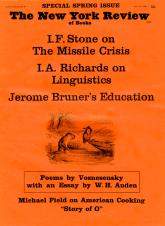In response to:
Guided Tour from the February 3, 1966 issue
To the Editors:
My attention has been called, very belatedly I fear, to a review of my book The Proud Tower by Mr. James Joll of Oxford University which appeared recently in your columns [Feb. 3]. Mr. Joll charges me with justifying my “neglect” of Freud on the ground that his Interpretation of Dreams “attracted little attention and it took eight years to sell out the edition of six hundred copies.”
This is of course a misstatement and, it seems to me, a deliberate one. The quotation is correct but it is not the ground on which I chose not to include Freud as a major figure in the book. I specifically explained in my Foreword the determinants of my process of selection as follows:
“In choice of subjects the criterion I used was that they must be truly representative of the period in question and have exerted their major influence on civilization before 1914, not after. This consideration ruled out the automobile and airplane, Freud and Einstein and the movements they represented.”
It is a useful practice for a reviewer to read an author’s Foreword. I recommend it to Mr. Joll.
Barbara Tuchman
New York City
James Joll replies:
Mrs. Tuchman accuses me of deliberate misstatement, but I cannot see why. She says that her criterion for choice of subjects was “that they must be truly representative of the period in question and have exerted their influence on civilization before 1914, not after.” I say that she omits Freud because his Interpretation of Dreams attracted little attention at the time of publication. Surely this is just an example of the application of her criterion in practice, and, incidentally, of the reasons for which I questioned the criterion’s validity.
Mrs. Tuchman also accuses me of not reading her Foreword. I not only read it, but actually quoted from it in the third paragraph of my review. It is a useful practice for an author to read a review before complaining of it. I recommend it to Mrs. Tuchman.
This Issue
April 14, 1966



